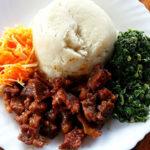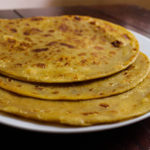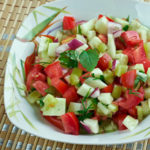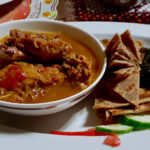Hey Everyone! In case you didn’t know March is National Nutrition Month – basically every dietitian’s favorite month of the year! It is definitely worth celebrating all month long! And what is this dietitian’s favorite way to celebrate? By enjoying amazing food, of course!
Presently we are in a culture where overeating is prevalent and mindful intuitive eating is becoming mainstream. We need to strike a balance between genuinely enjoying the eating experience, nourishing our bodies with what it needs to function at its highest capacity, and yet allowing ourselves to indulge in all foods in moderation, proper portion and balance. It’s really about listening to our bodies and being mindful and intuitive throughout the whole eating experience. Quite the harmonizing act, but all in the name of appreciating our food and allowing it to sustain our bodies so we can feel our personal best!
Food is a big part of every culture and every person, everywhere on planet earth. It truly has the power to connect and is inclusive of everyone. Food has the power to bring us to the table for conversation, relationship building and enjoyment of the food experience which includes both eating and preparation. Throughout my travels around the world that is the biggest theme.
Many of you know that my husband is from Kenya and we make it a point to travel there as often as possible so that our boys can know their family and know Kenya in a very personal and genuine way, especially in terms of the food experience. I wanted to take time to share the meaning of food and the eating experience in Kenya – the symbolism of food is incredible, and every culture and society holds their own beliefs.
In traditional Kenyan fare, there is ALWAYS sautéed greens, its not a meal without them. In fact, the most common green is called Skuma Wiki – think of it like kale or collard greens. The meaning behind it in Kiswahili – one of the main languages is, “to get through the week.” Families that are unable to afford other foods rely on this very common and low-cost green to satisfy them through the week when other foods are unavailable due to cost.
 Ugali – Many Kenyans, especially the men don’t believe they can be truly satisfied or full without this staple. It is a corn-based flour that is cooked and formed into a dense cake. This is basically the mashed potatoes of Kenya!
Ugali – Many Kenyans, especially the men don’t believe they can be truly satisfied or full without this staple. It is a corn-based flour that is cooked and formed into a dense cake. This is basically the mashed potatoes of Kenya!
 Chapati – this is like a homemade flour tortilla. It’s my ABSOLUTE favorite food in Kenya. My son LOVES them, and he begs Grandma Kenya (as we call her) to make them literally every day when he is with her. There is so much time and effort including very special skills put in to make the perfect chapati. It is served to visitors, especially after a long safari (journey) to symbolize appreciation of the visitor and a very sincere welcome to the guest.
Chapati – this is like a homemade flour tortilla. It’s my ABSOLUTE favorite food in Kenya. My son LOVES them, and he begs Grandma Kenya (as we call her) to make them literally every day when he is with her. There is so much time and effort including very special skills put in to make the perfect chapati. It is served to visitors, especially after a long safari (journey) to symbolize appreciation of the visitor and a very sincere welcome to the guest.
 Kachumbari – This is like a side salad but think of it as a fresh salsa. It has diced tomatoes, chopped onions, cilantro, a squeeze of lemon and sometimes fresh avocados.
Kachumbari – This is like a side salad but think of it as a fresh salsa. It has diced tomatoes, chopped onions, cilantro, a squeeze of lemon and sometimes fresh avocados.
 Meat – Meat is expensive in Kenya. The most common meats served are beef and goat. The meat is either roasted on the grill (choma) or put into a stew to dip the ugali and chapati. Meat is really a status symbol of wealth in Kenya. It is very common for a well-to-do Kenyan to slaughter a whole goat or even a whole cow depending on the number of guests, as a welcome and symbol of genuine appreciation for the guests visiting. Someone who is less financially fortunate will provide the best that they have, even if it means the family will suffer for the week leading up to the visit and the week after hosting a guest. If a chicken is available, the host will even slaughter their last chicken and prepare it for the guest.
Meat – Meat is expensive in Kenya. The most common meats served are beef and goat. The meat is either roasted on the grill (choma) or put into a stew to dip the ugali and chapati. Meat is really a status symbol of wealth in Kenya. It is very common for a well-to-do Kenyan to slaughter a whole goat or even a whole cow depending on the number of guests, as a welcome and symbol of genuine appreciation for the guests visiting. Someone who is less financially fortunate will provide the best that they have, even if it means the family will suffer for the week leading up to the visit and the week after hosting a guest. If a chicken is available, the host will even slaughter their last chicken and prepare it for the guest.
If you haven’t noticed, the guest is truly the most important person in the Kenyan culture and Kenyans hold them to the highest regard, truly rolling out the red carpet to their greatest capacity to make their guest feel most welcome and most comfortable. This is all accomplished through the food offered and the event of the meal shared at the table.
This is only the beginning of the food symbolism in the Kenyan culture. Where are your roots and family heritage/ancestry? We would love to hear! What are the most important foods in your culture and what are their meanings?
“Food is our common ground and our universal experience” – James Beard
“The power of food is very spiritual. It not only brings the whole family on the same table, but also brings the whole world together” – Vikas Khanna
Peace and Wellness,
Ashley, RD, LD









